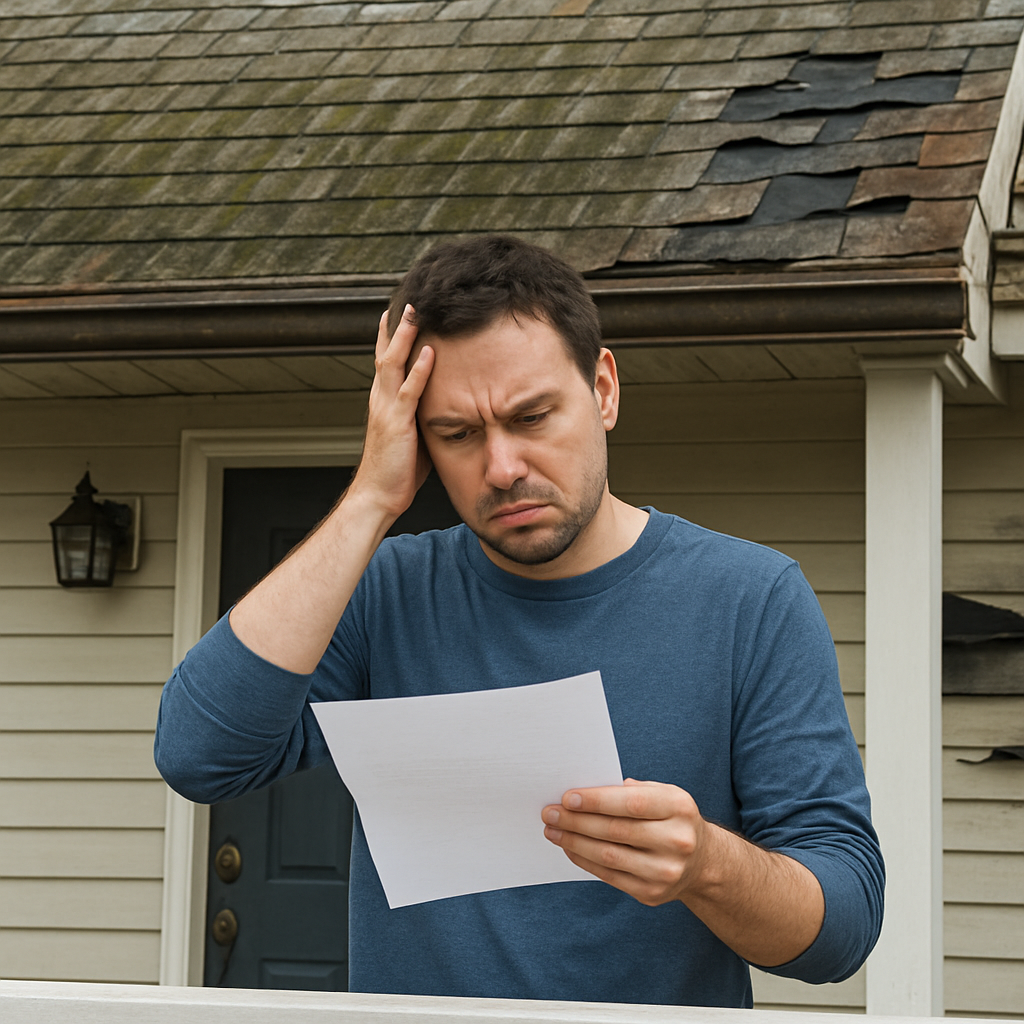Received a Roof Non-Renewal Notice from Your Insurer? Here's What to Do

Few letters in the mail are more frustrating for a homeowner than a notice that your insurance company won't renew your policy because of your roof. Suddenly, you're faced with the possibility of losing coverage or being forced to replace a roof you thought still had life left in it.
This situation has become increasingly common in Illinois as major insurers tighten their standards. At Happy Roofing, we've worked with homeowners in Naperville, Illinois, and the surrounding area who found themselves on tight deadlines after receiving a non-renewal notice.
Through those experiences, we've learned what insurance companies are really looking for, what options homeowners have, and how to take the right next steps without unnecessary stress. In this article, we'll break down:
- What these notices mean
- What to do if you receive one
- How to prevent it from happening again
By the end, you'll not only understand why non-renewal notices happen, but also feel confident in the steps you can take to address the situation and protect your home moving forward.
Table of Contents
- What Does a Roof Non-Renewal Notice Mean?
- Can I Appeal a Non-Renewal Notice?
- What Should I Do if I Receive a Non-Renewal Notice?
- What if the Non-Renewal Notice is Justified?
- What if I Received a Non-Renewal Notice but My Roof Is Still Good?
- What Happens if I Ignore a Non-Renewal Notice?
- How to Prevent Non-Renewal Notices
- The First Step to Take to Stay Insured
What Does a Roof Non-Renewal Notice Mean?
A roof non-renewal notice is a letter from your insurance company stating that they will not continue your homeowner's policy unless your roof is replaced by a specific deadline. In other words, it's not a suggestion; it's a requirement to keep your coverage.
In our experience, it's becoming more common in Illinois as major insurers tighten their standards. Homeowners we've spoken with are often caught off guard, since these notices don't always include detailed reasoning and come with little warning. In many cases, the reason for the non-renewal comes down to:
- Age or appearance of the roof: Even if a roof is still structurally sound, insurers may flag it if it "looks" old, weathered, or has algae streaks.
- Perceived risk of leaks or failure: Companies are increasingly focused on limiting liability. A roof that looks worn is seen as a higher risk for future claims.
- Broad policy changes: Larger insurance providers may implement stricter rules across their customer base, regardless of individual roof condition.
Can Insurers Provide a Roof Non-Renewal Notice Without an Inspection?
According to the Illinois Department of Insurance, companies are not required to perform a physical inspection before issuing a non-renewal. Instead, they may rely on aerial photos, drive-by checks, or even software dashboards to make their determination. This means that even a roof that looks weathered, but is structurally sound, could trigger a non-renewal notice from your insurer.
Can I Appeal a Roof Non-Renewal Notice?
Your right to dispute a non-renewal notice varies by state. In Illinois, you do have the right to appeal a non-renewal if you believe your insurer hasn't followed the law.
While insurance companies have broad authority to decide which risks they'll cover, they must follow specific rules when ending your policy.
- Notice requirements: If you’ve had your policy for less than 5 years, your insurer must give at least 30 days’ notice before non-renewal. If it’s been 5 years or longer, they must provide 60 days’ notice. The only exceptions are cases involving fraud or misrepresentation.
- Repairs before non-renewal: If the reason for the notice is due to property condition, such as roof deterioration, Illinois law requires that homeowners be given up to 90 days to make repairs before the non-renewal is finalized.
- Your right to a hearing: If you feel the non-renewal wasn’t issued fairly or in compliance with these rules, you can file a written request for a hearing with the Illinois Director of Insurance. This request must be submitted at least 20 days before your policy expires.
While appealing doesn't guarantee your insurer will reverse the decision, it can buy you time, and in some cases, prevent you from being forced into an unnecessary replacement.
What Should I Do After Receiving a Roof Non-Renewal Notice?
Start by requesting the reason in writing, gathering documentation, and scheduling an independent roof assessment. These steps will help you determine whether the notice is truly justified and what your best options are moving forward. Remember, a non-renewal notice doesn't mean you've suddenly lost coverage; it simply means your policy won't be renewed at its next expiration date, giving you valuable time to act.
Step 1: Read the notice carefully
Pay close attention to the effective date on the notice and any deadlines for action. This will give you a clear sense of your timeline. Even if the notice feels vague, don't assume there's nothing you can do. Most homeowners have between 30–60 days to act, depending on how long they've been insured.
Step 2: Request the reason in writing
In Illinois, you're entitled to know exactly why your policy isn't being renewed. Don't settle for assumptions, and instead ask your insurer to provide the reason in writing by calling your agent and asking them to confirm your non-renewal notice, or sending a written request (through email, referencing your policy number and notice). In some cases, the trigger isn't an actual leak or failure, but rather something cosmetic like streaking from algae or an aged appearance. Having the reason documented gives you leverage and helps your roofing contractor or inspector focus on the right issues.
Step 3: Gather documentation on your roof
Start building a file of any documentation you may have of your roof. That includes any photos, receipts for past repairs, warranty paperwork, and any recent inspection reports. Documentation not only strengthens your case if you appeal, but it also helps if you want to shop around for other insurance providers, who will likely require details before taking on your coverage.
Step 4: Schedule an independent roof assessment
Insurance companies don't always send a roofing professional to inspect your home. Instead, they may rely on aerial imagery or algorithms that can't account for real-world conditions. That's why getting a professional assessment is so valuable. A thorough roofing inspection can confirm whether the non-renewal is justified, identify whether the problem is cosmetic or structural, and give you clear options to move forward.
You can follow this quick checklist to make sure you're covering all areas if you've received a non-renewal notice:
| Action | Why It Matters |
| Read the notice carefully | Understand deadlines and policy termination date. |
| Request written verification |
Get documented proof of the insurer’s reason for sending the non-renewal notice. |
| Gather documentation |
Compiling receipts, warranties, and past inspections can support your appeal/case. |
| Schedule an independent roof inspection | Determine if the non-renewal is justified or cosmetic. |
What If the Assessment Shows My Roof Needs Replacement?
In this case, the focus shifts to acting quickly regarding a roof replacement, so you don't risk a lapse in coverage. If your independent roof assessment confirms that your roof truly is at the end of its life, or if safety risks are verified, the non-renewal may be justified. You'll want to:
- Get multiple quotes to understand your options and price ranges. Roofing costs can vary widely between companies depending on materials, workmanship, and warranties. Comparing quotes helps you make a confident, informed decision instead of rushing into the first option under pressure.
- Prioritize choosing a roofing company that can complete the replacement before your policy expires. Even if you sign a contract, insurers may not extend your coverage unless the replacement is completed before the deadline specified in the non-renewal notice. Securing a company with availability is necessary to stay insured.
- Share your replacement timeline with your insurance provider. Keeping your insurer in the loop shows good faith that you're addressing the issue. This transparency can reduce the risk of misunderstandings and ensure there's a clear record of your efforts to maintain coverage, making the entire process more likely to run smoothly.
The sooner you take action, the better chance you have of completing your roof replacement before the deadline. Giving yourself more time also ensures you work with a contractor that you're comfortable with, and can do prior research so you're confident with the quality of work that they provide.
What If the Inspection Shows Your Roof Is Still in Good Shape?
If your assessment finds the roof is structurally sound, you may have grounds to appeal the non-renewal, depending on your state. Here's how to use that information effectively, and what you can do next:
- Use the inspection report and photos to request a review with your insurer. A professional report carries more weight than just your word as a homeowner. Submitting documented proof can sometimes prompt insurers to reconsider, especially if their decision was based on aerial photos or a surface-level assessment alone.
- Ask if the issue is cosmetic (such as staining or algae streaks) rather than functional. Many non-renewals are triggered by appearance rather than physical roof performance. If the concern is purely cosmetic, you may be able to remedy the notice with cleaning or maintenance instead of a costly replacement.
- Explore the option of appealing through the Illinois (or your state equivalent's) Department of Insurance if you believe the non-renewal doesn't comply with state rules. Illinois homeowners have the right to appeal. If your roof is sound, can be documented and proven, and your insurer refuses to reconsider, filing a complaint or appeal ensures the situation gets an impartial review.
- Consider getting quotes from other insurance providers, because some may evaluate your roof differently. Not all insurers apply the same standards. While one company may see an aged-looking roof as a liability, another may focus more on actual performance and inspection results. Shopping around can keep you insured without being forced into unnecessary replacement costs.
This path is about using facts to your advantage so you don't get forced into an unnecessary replacement. If you believe the non-renewal isn't warranted, we highly recommend documenting every piece of information and proof that you've gathered throughout the process for a greater chance at a reversal.
What Happens If I Ignore a Non-Renewal Notice?
If you take no action after receiving a non-renewal notice, your current coverage will simply end on the effective date listed in the notice. That means your home will be uninsured moving forward, leaving you financially exposed if damage occurs.
Additionally, most mortgage lenders require continuous coverage. If your insurance lapses, your lender may purchase what's called force-placed insurance on your behalf. This type of coverage is usually much more expensive than a standard homeowner's policy and is meant to protect the lender's financial investment rather than your property, belongings, or liability.
Ignoring a non-renewal doesn't make the problem go away. It creates higher costs, more risk, and fewer options later. It's important to get in contact with your insurance provider if you receive a notice, and show that you're actively trying to resolve the issue.
How Can I Prevent Roof Non-Renewal Notices?
While you can't always predict what your insurance company will decide, there are proactive steps you can take, like periodic inspections and regular maintenance, to reduce the risk of receiving a non-renewal notice in the first place.
Here are some things you can do to stay ahead of your roof's health:
- Stay on top of regular maintenance: Simple actions like cleaning gutters and trimming back overhanging branches can extend your roof's life and also maintain its appearance. Clogged gutters could cause water to back up, and eventually work its way under the shingles or behind flashing and into the home. Overhanging branches can lead to shingle damage if they fall or make contact with the roof, and the constant shade can promote algae growth in moist climates.
- Address cosmetic issues: Algae streaking appears as dark staining on shingles. While it may not affect performance, it can make a roof look aged in the eyes of an insurer. Gentle roof cleaning solutions or professional soft washing can remove algae before it causes permanent discoloration, helping your roof look newer for longer.
- Consider algae-resistant shingles for your next replacement: Some modern shingles are designed with built-in resistance to algae growth. Manufacturers who offer this technology, like Malarkey and GAF, typically use copper-infused granules to achieve this. Choosing these materials during a replacement can help prevent the issue from recurring years down the line.
- Schedule periodic professional inspections: Having a roofer document your roof's condition every few years creates a paper trail of evidence you can use if questions ever arise. These records can be invaluable if your insurer claims your roof is riskier than it really is, and can make you aware of potential problems before they grow. We recommend a general inspection every 5-7 years.
By taking these steps, you'll not only extend the life of your roof but also protect yourself from the surprise and stress of an unnecessary non-renewal notice.
Your First Step to Protect Your Home and Stay Insured
If you've received a roof non-renewal notice, the most important thing is to take action before your policy expires. Whether that means scheduling a replacement or building your case to keep your coverage, the first step should always be a thorough assessment of your roof's condition.
A proper roof assessment will give you the documentation you need to make confident decisions. To help you understand what goes into this process, we've put together this guide: Roof Inspections Explained: When to Get One, What We Include, and Why It Matters. Inside, we'll show you exactly what a professional inspection should cover, why it's so valuable for both homeowners and insurers, and how it helps you avoid unnecessary surprises.
If you'd rather get answers right away, you can schedule a no-commitment roof assessment with our team. We'll give you a clear, unbiased picture of your roof's health and help you determine whether your non-renewal notice is truly warranted.
The Author: Pedro Toledano
Happy Roofing is a trusted roofing company dedicated to providing top-quality roofing services to residential and commercial clients. With years of experience, they specialize in roof installations, repairs, and maintenance, ensuring durability and customer satisfaction. The team is known for their professional approach, timely service, and attention to detail. Happy Roofing prides itself on using high-quality materials and offering competitive pricing. Follow their Facebook page for updates on projects, customer testimonials, and tips on maintaining your roof in excellent condition.





